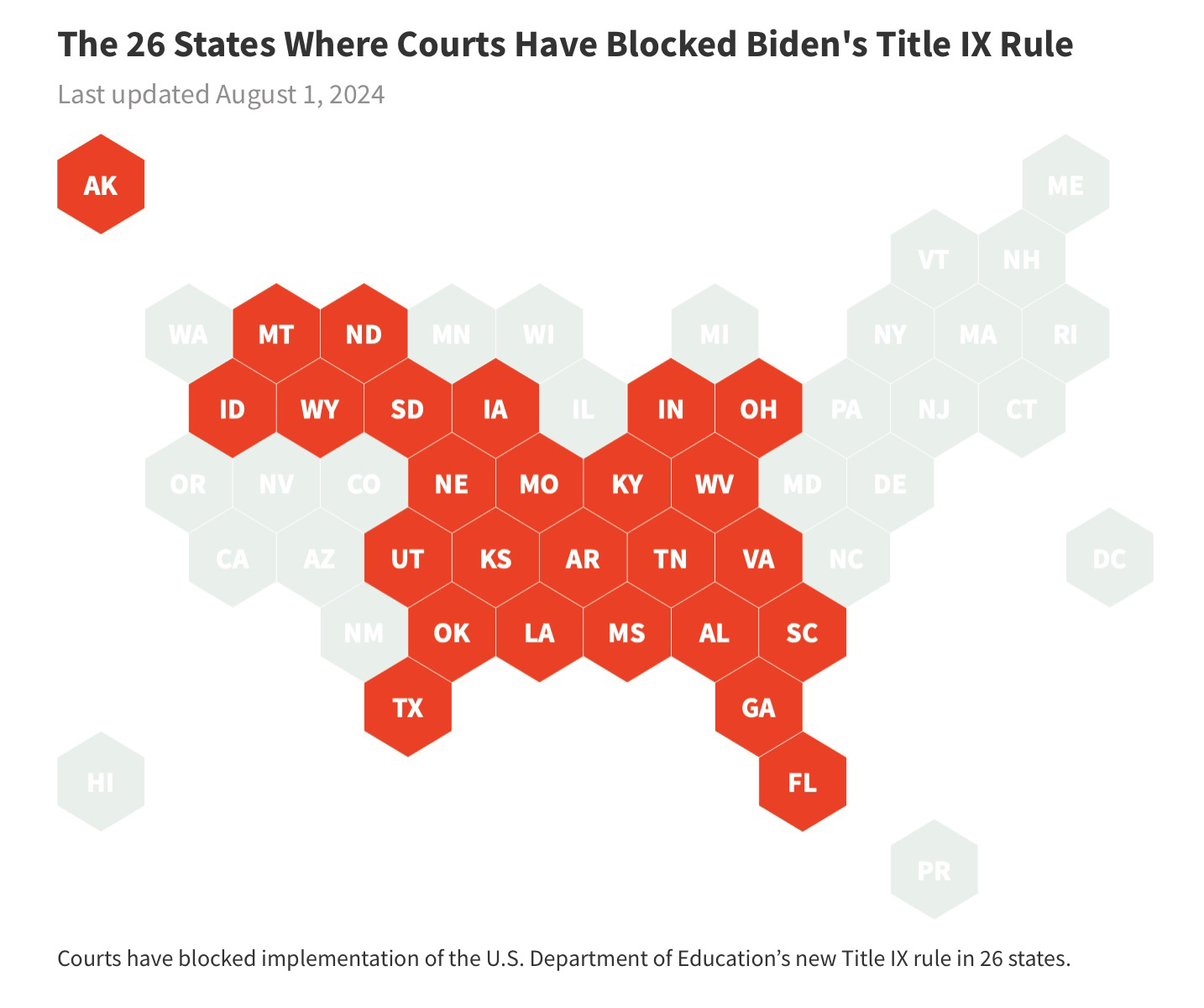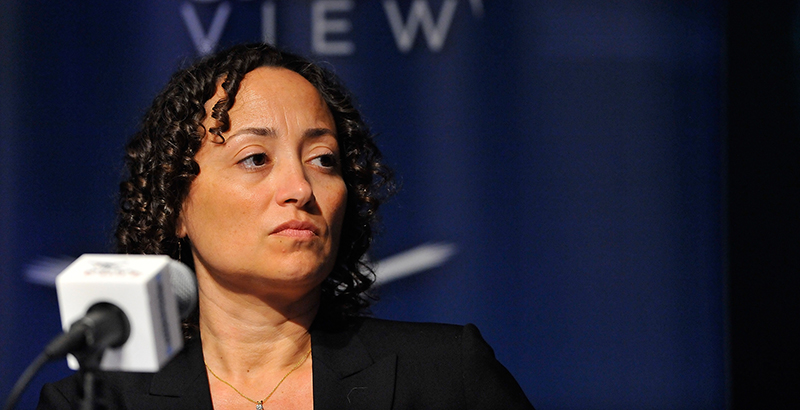Title IX ‘milestone’ goes into effect for students in less than half the country
Linda Jacobson | August 5, 2024
Your donation will help us produce journalism like this. Please give today.

U.S. Education Secretary Miguel Cardona described the legal challenges to the new Title IX rule as “efforts to sow more division in our country.” (Getty Images)
New protections against sexual harassment and discrimination, including for LGBTQ students, went into effect in less than half the country on Thursday as legal challenges to the Biden administration’s Title IX rewrite pile up.
Nonetheless, in a webinar with district and college officials, Education Secretary Miguel Cardona called the new rule a major “milestone” and the “culmination of a lengthy and thorough process that included unprecedented public input.” He also noted resistance from Republicans in a legal battle that changes almost daily.
“I want to loudly and unapologetically reject any efforts to politicize Title IX or efforts to sow more division in our country,” he said. “These rules are about living up to America’s highest ideals.”
On Wednesday, federal courts blocked the regulation in Alabama, Florida, Georgia, South Carolina and Oklahoma, bringing to 26 the total number of GOP-led states where schools are still operating under the 2020 Trump-era rule. Further demonstrating the uncharted territory in which the long-awaited rule takes effect, hundreds of schools and colleges in blue states are also prohibited from implementing it under a court order that applies to children of members of the conservative Moms for Liberty organization and students involved in two other advocacy groups.
Solicitor General Elizabeth Prelogar asked the U.S. Supreme Court to allow the department to move ahead with most of the rule in 10 states except for provisions related to trans students that have caused the most controversy. By Thursday morning, the court still had not acted on those appeals.

One of President Joe Biden’s earliest priorities, the new rule extends protections to LGBTQ students and requires schools to promptly investigate accusations of sexual misconduct and discrimination. But every Republican attorney general who sued to stop implementation until the courts weigh the legal merits of the rule got their wish.
The overhaul replaced the rule issued under former Education Secretary Betsy DeVos, which required live hearings so male students could face their accusers and narrowed the types of complaints that schools had to investigate. Republicans argue that the administration had no authority to apply a 2020 Supreme Court ruling about protections for LGBTQ employees in the workplace to a law intended to provide equal educational opportunities for women.
Conservatives have directed much of their opposition to a draft rule for trans students’ participation in sports, but the Education Department has not finalized it yet.
“This Title IX rule is a slap in the face to the women and girls who prepare for competition and will now have to compete on an uneven playing field,” North Carolina Republican Rep. Virginia Foxx, chair of the House education committee, said Wednesday on a call with the Independent Women’s Forum. The advocacy organization joined a lawsuit over the rule filed by Alabama, Georgia, Florida and South Carolina. “This rule is unjust and directly in conflict with athletics’ core principles of integrity and fairness.”
The rapidly changing legal landscape has created a chaotic rollout, especially in districts where the rule can be implemented in some schools, but not others, like the 2,000 serving children of Moms for Liberty members.
“The mixed messages coming from state officials have been detrimental to not just implementation of the rule, but also to broader efforts to create safer school environments,” said Brian Dittmeier, the director of public policy for GLSEN, which advocates for LGBTQ students in K-12 schools. “Families have been long awaiting clarity about the protections available to them. From the administrative side, folks really want to move forward and implement the rule.”
LGBTQ students are less likely than straight students to report bullying and sexual harassment, he said. But they are more likely to file complaints when school policies expressly say they are protected. Among the resources the department issued last week are suggested nondiscrimination statements.
In schools where the new rule is implemented, “you’ll likely see higher rates of reporting,” among LGBTQ students, Dittmeier said, “and then school staff are accountable for that.”
Compared to the 2020 rule, the rewritten regulations “fill troubling gaps,” said Catherine Lhamon, assistant education secretary for civil rights. The previous rule focused more on sexual harassment, while the 2024 provisions address sex discrimination more broadly, including protections for pregnant and parenting students and employees.
As for the provisions regarding LGBTQ students, she said, “We anticipated this moment when we were finalizing the 2024 regulations and we know they are legally sound.”

The DeVos rule defined a hostile environment as being “severe, pervasive and objectively offensive.” The new rule lowers the bar a bit, stating that such harassment can be subjective and either severe or pervasive enough to prevent a student from participating in learning or other school-related programs and activities.
Opponents of the rule object the most to three specific sections — one that says sex discrimination includes LGBTQ students, another that states trans students can use locker rooms and restrooms that match their gender identity and a third discussing “hostile-environment harassment.”
Some states, like California, already have laws allowing trans students to use the bathrooms or locker rooms where they are most comfortable. In those cases, that practice can continue even in schools with children of Moms for Liberty members. San Diego Unified, for example, has 23 schools on the list.
The injunction “does not create a new law that would supersede state law,” explained W. Scott Lewis, managing partner with TNG Consulting, which trains districts across the country on Title IX.
But under the injunction, a student would not be able to file a Title IX claim if a teacher doesn’t use their new name or pronoun.
For now, the courts are only deciding whether states can delay implementation, and experts say if arguments over the rule itself eventually reach the Supreme Court, it likely won’t happen until 2025. But Dittmeier said none of the injunctions keep LGBTQ students from filing complaints or lawsuits under the old rule or other legal provisions.
The U.S. Court of Appeals for the Fourth Circuit, for example, ruled in April that a trans girl in West Virginia, who sued under the 2020 rule and brought an equal protection claim, can continue to compete on a girls cross-country track team. The state has appealed the case to the Supreme Court.
States suing over the rule are “exposing themselves to greater litigation risk because students can still sue them for failure to ensure their civil rights,” he said. “While the new rule is significant, it is not the only remedy available to LGBTQ students.”
This article was published in partnership with The 74. Sign up for The 74’s newsletter here.